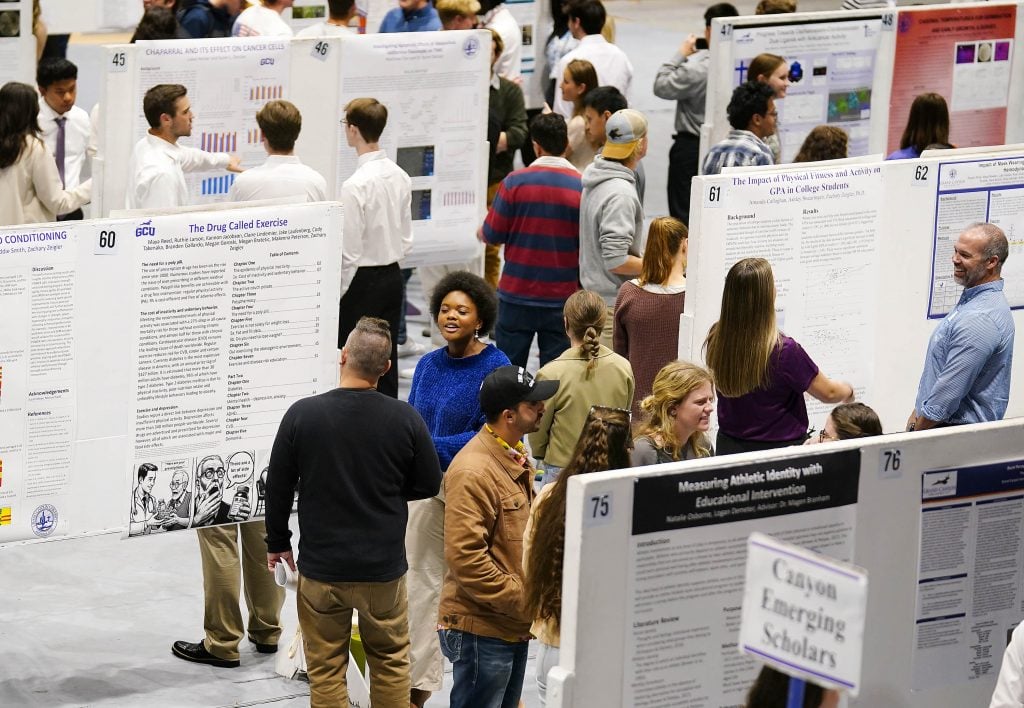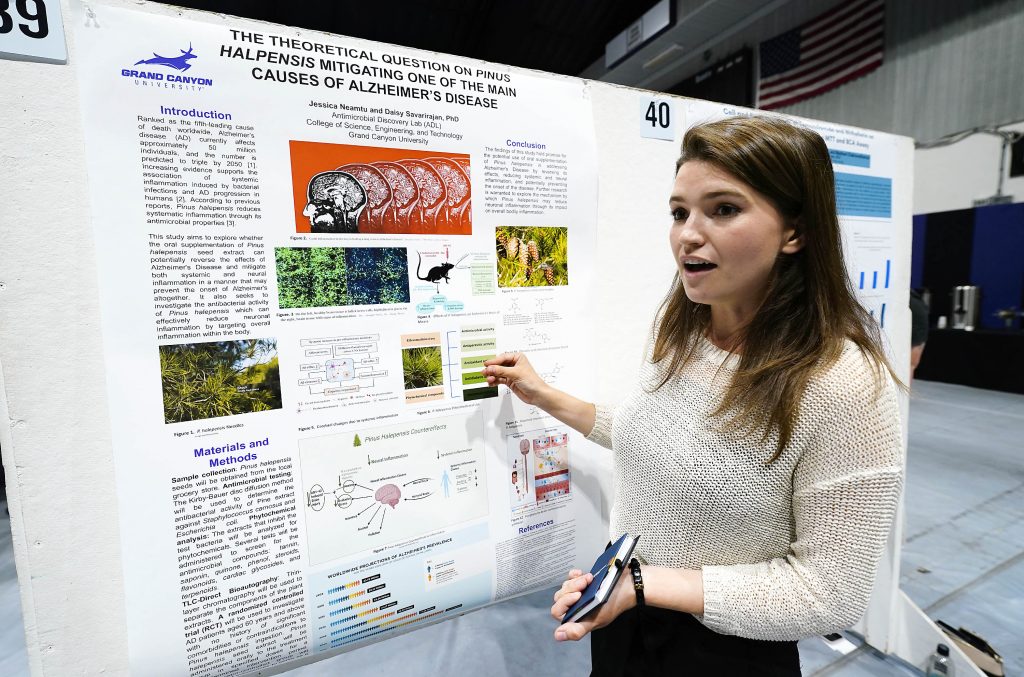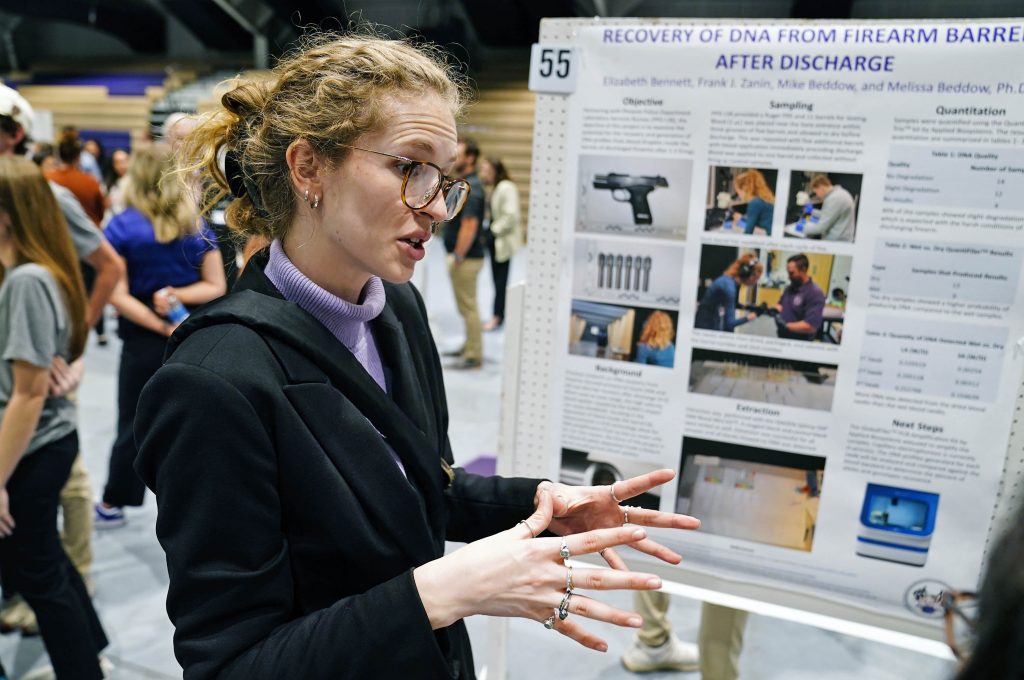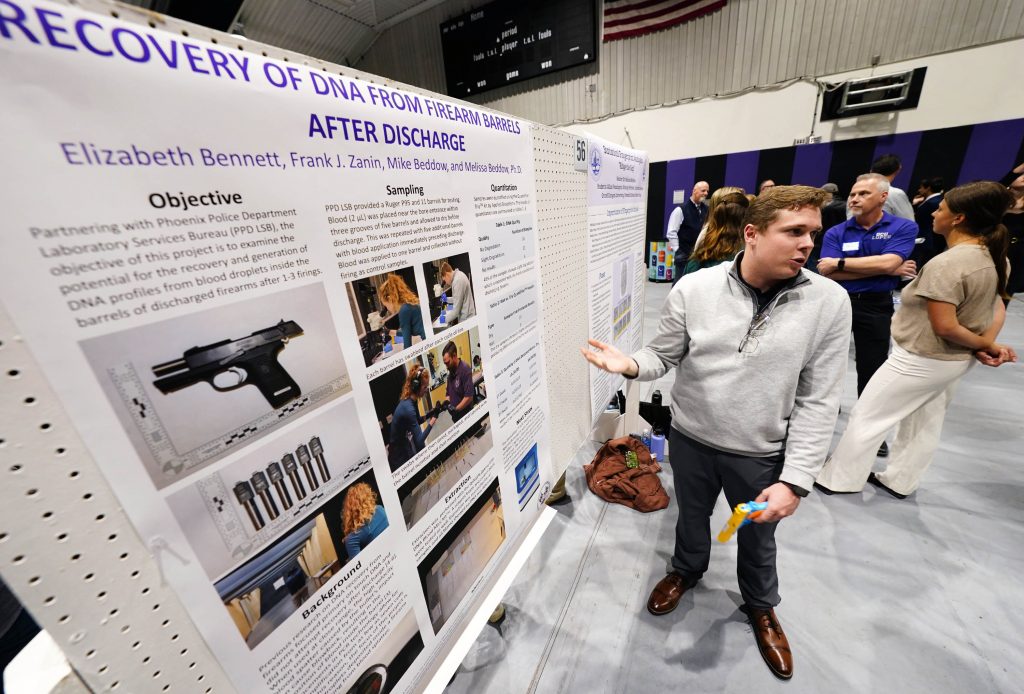
Photos by Ralph Freso
Logan Morris was going through an emergency medical technician program and was transfixed by what he saw during diabetic emergencies.
The Grand Canyon University biology/pre-med junior saw patients’ mental states change suddenly – drastically, really – during those emergencies.
Then he heard his mom talk about Type 3 diabetes, a term researchers have associated with a theory that insulin resistance in the brain may cause Alzheimer’s disease.
“I was fascinated by that,” said Morris, one of the students packing Antelope Gymnasium on Monday in the poster presentation session of the Canyon Undergraduate Research Conference, a wide-ranging event to showcase multidisciplinary research and projects undertaken by students across the University’s colleges with a focus on students involved in the Research and Design Program (RDP), Canyon Emerging Scholars, Canyon Journal of Undergraduate Research and the Honors College.
The poster presentations were just a portion of the conference, whose scope also included oral presentations peppered in classrooms across campus. Sandwiched between all that was the Canyon Undergraduate Research Symposium, in which students presented their work to campus leaders, including University President Brian Mueller – work being considered for publication in the second edition of the Canyon Journal of Undergraduate Research.

Morris was among the students sharing their work in more than 75 poster presentations that ranged from the impact of physical fitness on a college student’s GPA, to a study of a horned lizard overwintering in an artificial owl burrow, to a study on herbal teas and their effect on allergic rhinitis and infections.
In his research on the link between diabetes and Alzheimer’s disease, Morris learned that the brain relies on a stable glucose level. But diabetics frequently fluctuate in their glucose levels, which affects the brain.
“It’s a growing area of research,” Morris said. “Diabetics are known to face a 65% increased risk of developing Alzheimer’s disease. I spent last summer looking at current research on the topic to develop my own project.”
Morris treated SH-SY5Y cells, or neuroblastoma cells, with DL-glycealdehyde. He was able to then burst the cells open so he could see how much protein was present in different samples. Alzheimer’s disease is thought to be caused by the abnormal build-up of proteins in and around brain cells.
What's cool is this research has applications that could change the field.
Scott Rex, forensic science professor
“He’s put in a lot of effort. This is clearly high quality work” said Dr. Sherlin Moses, who is his faculty mentor in the project along with Dr. Hikmet Nural-Guvener. They’re all part of the RDP’s Canyon Neuroscience Group.
And he wasn’t the only student whose project focused on Alzheimer’s disease.
Jessica Neamtu wants to see if pinus halpensis, more commonly known as the Aleppo pine, might be beneficial in the fight against Alzheimer’s disease.
The molecular and cellular biology major, like Morris, said she became fascinated with what she learned in a class she took last semester in which she studied Alzheimer’s disease for a paper she had to present.
“That made me kind of obsessed with it,” she said of Alzheimer’s disease research.
For this project, she discovered that essential oils from the Aleppo pine reduced depression and anxiety, neuroinflammation, oxidative stress and DNA damage in tests on mice.
“The mice started to stop exhibiting the symptoms of Alzhemier’s. They were starting to act normal again. I was blown away,” she said.

Neamtu, who is mentored by Dr. Daisy Savarirajan in the RDP Antimicrobial Discovery Lab, proposes taking that research a step further.
“My theory is that ingesting it (pinus halpensis) orally is going to be more effective.”
Forensic science students Elizabeth Bennett and Frank Zanin tackled a project suggested by their research mentors, GCU forensic science associate professor Dr. Melissa Beddow and Michael Beddow of the Phoenix Police Crime Lab.
While investigators often look for DNA on the outside of a firearm, they don’t really focus on the inside of a firearm for that DNA.
“There’s not really a lot of previous research on this,” said Zanin who, along with Bennett, will graduate at the end of the month.
The students placed blood inside a gun and fired it to see if, even when exposed to all the friction involved in shooting a firearm, they could still collect viable DNA, which is already fragile to begin with.
Bennett and Zanin used one gun and 11 different barrels, depositing wet blood and dry blood in those barrels. The result: They got 50% more DNA from the dry samples than the wet samples.
“I was honestly surprised,” said Bennett of the study. “There’s so much going on inside of a gun barrel after the gun is fired.”
GCU forensic science professor Scott Rex said in research like this students are "filling a gap that’s in the field.”
Oftentimes, forensic scientists, always challenged with time in busy crime labs, don’t always have time to do this kind of research.

Rex added, “What’s cool is this research has applications that could change the field.”
Canyon Emerging Scholar Adriana Revilla Bernal didn’t have to look far to come up with a subject for her academic work. The history major in the College of Humanities and Social Sciences looked inward for her paper, “Breaking the Silence: A Single Mother’s Resilience in Pursuit of Higher Education.”
Revilla Bernal took an academic journal writing class last semester in the Honors College that led to her poster presentation. She had to write about a problem and, through reflective practice, evaluate the factors that led to the problem.
So she simply told her story and the obstacles to getting her degree.
“For me, being able to research was fun but incredibly taxing because it’s my story,” she said.
Revilla Bernal is a young, undocumented immigrant protected under Deferred Action for Childhood Arrivals (DACA), as well as single mom who went through a divorce at a young age, something she did not want to do because of “the fear of being ostracized by my family and the community.”
But perhaps the biggest factor that contributed to her academic struggles: “In my case, it was being a victim of domestic violence.”
She started at GCU in 2015, not knowing if DACA would end under the Trump administration. She ended up with a lot of F’s and withdrawals, she said, and had to take a year off to recenter herself, she said. It was unfortunate because, at the time, she had only one semester to go.
Now back in school after her divorce, she sees the difference between the experiences of traditional on-ground students versus commuters and single parents, like her.
“I saw the shift of what it means to have a lot of resources,” and then not as many, said Revilla Bernal, whose goal is to earn her Ph.D. and teach history. “We kind of get lost in the cracks.”
But her professors and the GCU community pushed her forward and, with a lot of grace, “helped me get to where I am, and now I’m graduating.”
It’s a story that could continue when she’s the professor helping students with their research -- when she's the one helping them to continue to be fascinated with their academic pursuits.
GCU Manager of Internal Communications Lana Sweeten-Shults can be reached at [email protected] or at 602-639-7901.
Related content:
GCU News: Students’ passion projects on display at symposium
GCU News: Positive psychology one of the pluses at undergraduate research symposium















